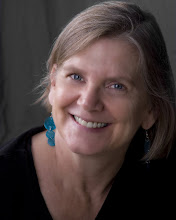"Wah, wah, wah I don't want to edit my writing. Wah, wah, wah, I want someone else to do it and make it all pretty. Wah, wah, wah writing is poopy. Wahhhhhhhhhhhhhhhhhhhhhhhhhhhhhhhhhhhhh.
Thanks for this indulgence.
Judi (wah)"
Judi just sent me the above in an email.
Here's what I have to say. Let me edit any time. Having assembled words to work with is so much less traumatizing than staring at a BLANK PAGE. FOTP I call it--Fear of the Page.
My husband says there are two kinds of writers: those who fear getting started and those who fear getting finished. Once something is declared finished then it's ready for public scrutiny, a scary prospect. But not, to me, as scary as the BLANK PAGE.
Some people can't let go; they never stop reworking. Raymond Carver edited and edited--with some help from his friends--certain of his already published stories, "A Small Good Thing," for one. It was Degas, or maybe Matisse, who continued to touch up his paintings, even after they were hanging on the walls of museums.
Not me. Once it's in print, I'm done. Onward! To another blank page. Gulp.
Wednesday, March 22, 2006
Wednesday, March 01, 2006
THE instant, not AN instant
The newspaper article I referred to in my last post was titled:
"Life changes in an instant." But to be precise, in "The Year of Magical Thinking,"
Didion's memoir about her husband's death and her exploration of
grief, she writes:
"Life changes in the instant."
What a difference: the use of "the" over "in."
Didion read last night and took questions. Talking about her early
writing days Didion said the editor at Vogue would get furious when
she came in every day with her eight lines of type and there were
"extra words."
Didion's writing is spare, fine-tuned, original. You won't find the cliche, the tired phrase, anything extra. Every sentence receives the same scrutiny. It was a pleasure to hear her read her own rhythmic prose, the refrains suggesting lament.
I wish I had asked her if she produces sloppy first drafts or if it
comes out of her head clean. Damn. My first drafts are blubbering
messes of words.
How about yours?
One more thing: She said she would write pages by day and sit and read them at night and cry.
"Life changes in an instant." But to be precise, in "The Year of Magical Thinking,"
Didion's memoir about her husband's death and her exploration of
grief, she writes:
"Life changes in the instant."
What a difference: the use of "the" over "in."
Didion read last night and took questions. Talking about her early
writing days Didion said the editor at Vogue would get furious when
she came in every day with her eight lines of type and there were
"extra words."
Didion's writing is spare, fine-tuned, original. You won't find the cliche, the tired phrase, anything extra. Every sentence receives the same scrutiny. It was a pleasure to hear her read her own rhythmic prose, the refrains suggesting lament.
I wish I had asked her if she produces sloppy first drafts or if it
comes out of her head clean. Damn. My first drafts are blubbering
messes of words.
How about yours?
One more thing: She said she would write pages by day and sit and read them at night and cry.
Subscribe to:
Comments (Atom)
